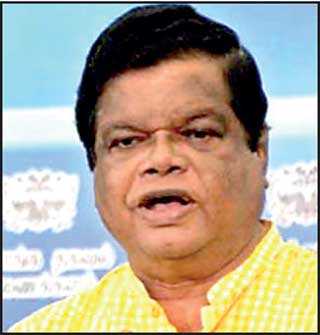Monday Apr 07, 2025
Monday Apr 07, 2025
Wednesday, 4 November 2020 00:30 - - {{hitsCtrl.values.hits}}
 |
| Trade Minister Bandula Gunawardena
|
Cabinet yesterday approved a national program to establish Export Production Villages that will include linking up existing agriculture, fisheries and services sectors to export companies.
The Cabinet of Ministers approved a proposal presented by Trade Minister Bandula Gunawardena to implement the Export Production Villages program. This program will have the dual goal of developing rural production within a formal enterprise model and link those with the export supply chain, as well as to upgrade local production industries as import replacements.
“The Government aims to establish cluster villages making similar products for export and provide opportunities for them to be exposed to the market as well as provide opportunities and support for the producers to minimise the issues they may face when starting a formal business or exporting goods,” the Government Information Department said in a statement.
The customary Cabinet briefing was not held this week.
Furthermore, it has been planned to establish Export Production Villages covering agricultural, fisheries, mechanical and services sectors so they will have a sustainable additional income by entering into future trade agreements with top level export companies.
Accordingly, the Cabinet of Ministers conceptually approved the resolution furnished by the Minister of Trade for implementing the proposed program utilising the required allocations from the Sri Lanka Export Development Board subject to the guidance of the Ministry of Trade.
The Export Production Villages (EPV) program was initiated in 1980 under the Ministry of Trade. The major objective of the program was to create employment and enhance the income and standard of living of the rural people in addition to encouraging foreign exchange earnings. However, despite multiple attempts it has yielded limited results,
The core idea of the major strategy of the EPV program is to organise production in villages directly for the export market. Under this program it was expected to start production based on advanced and secure marketing arrangements such as supply contracts for specific products at pre-agreed prices.
The products were expected to be directly purchased by export companies. The avoidance of involvement of intermediaries in the process of marketing was expected to bring about higher prices and more benefits for the producers.
The EPV program was expanded and became more popular by the late 1980s. EPV companies functioning in a number of districts were based on a wide range of products, rather than on agricultural products alone.
